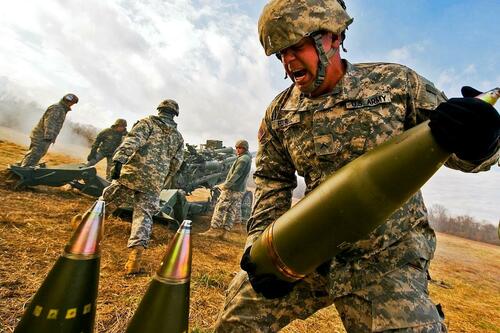
"It is not at the level we would like to go into combat," a US defense official told The Wall Street Journal of the Pentagon's fast depleting stockpiles due to unprecedented defense aid to Ukraine, and stressed in particular that artillery ammunition is now "uncomfortably low".
What's more is that the shortfall will likely last into the future, given the norm is for new purchases and then manufacturers supplying the weapons to take a process of years.
"The U.S. has during the past six months supplied Ukraine with 16 U.S. rocket launchers, known as Himars, thousands of guns, drones, missiles and other equipment. Much of that, including ammunition, has come directly from U.S. inventory, depleting stockpiles intended for unexpected threats, defense officials say," the report spells out.

In total so far, the US has pledged to send about $13 billion in arms to Ukraine after only six months of conflict. Given the alarm over Washington's own dwindling stockpiles, the DoD is now opting to send 105mm rounds to Ukraine instead of the 155mm guided 'smart' artillery shells.
In early July, a senior US defense official told reporters in a briefing that the Ukrainian army was at that point firing about 3,000 155mm shells per day:
The revelation came amid questioning on the latest tranche of weapons and ammunition being sent to Ukraine, including, for the first time 1,000 guided 155mm 'smart' shells.
The official said despite the high usage rate, Ukrainian forces still have "substantial stores" of 155mm rounds and are far from running out with more rounds on the way. The U.S. and NATO allies have donated hundreds of thousands of 155mm rounds to Ukraine.
But already at this point it seems the Pentagon is becoming increasingly uncomfortable with the rate of these 'donations'.
The Wall Street Journal report indicated further that the US Army has requested of Congress another $500 million per year to enhance its own ammo factories. It remains that the biggest winner in all of this is the big defense contractors and manufacturers.
THE EXCALIBUR: This artillery shell gives Ukraine’s 155mm artillery shells precision strike capability. pic.twitter.com/LukyTBWDar
— Chuck Pfarrer (@ChuckPfarrer) August 21, 2022
Meanwhile, other NATO allies are facing this same problem and worry, especially 'neutral' Germany which has dramatically shifted its historic stance on not sending weapons into foreign conflict zones. A number of German politicians have warned that Berlin should not be sharing weapons from its own arsenal, given that "Unfortunately, the situation here is such that we have an absolute deficit in our own stocks," according to the recent words of Foreign Minister Annalena Baerbock.
Speaking to German media agency ZDF, she said: "However, Germany must also think in the medium term. Due to the German arms problem, the armaments industry had to dedicatedly produce material for the Ukraine."
“It is not at the level we would like to go into combat,” a US defense official told The Wall Street Journal of the Pentagon’s fast depleting stockpiles due to unprecedented defense aid to Ukraine, and stressed in particular that artillery ammunition is now “uncomfortably low”.
What’s more is that the shortfall will likely last into the future, given the norm is for new purchases and then manufacturers supplying the weapons to take a process of years.
“The U.S. has during the past six months supplied Ukraine with 16 U.S. rocket launchers, known as Himars, thousands of guns, drones, missiles and other equipment. Much of that, including ammunition, has come directly from U.S. inventory, depleting stockpiles intended for unexpected threats, defense officials say,” the report spells out.

In total so far, the US has pledged to send about $13 billion in arms to Ukraine after only six months of conflict. Given the alarm over Washington’s own dwindling stockpiles, the DoD is now opting to send 105mm rounds to Ukraine instead of the 155mm guided ‘smart’ artillery shells.
In early July, a senior US defense official told reporters in a briefing that the Ukrainian army was at that point firing about 3,000 155mm shells per day:
The revelation came amid questioning on the latest tranche of weapons and ammunition being sent to Ukraine, including, for the first time 1,000 guided 155mm ‘smart’ shells.
The official said despite the high usage rate, Ukrainian forces still have “substantial stores” of 155mm rounds and are far from running out with more rounds on the way. The U.S. and NATO allies have donated hundreds of thousands of 155mm rounds to Ukraine.
But already at this point it seems the Pentagon is becoming increasingly uncomfortable with the rate of these ‘donations’.
The Wall Street Journal report indicated further that the US Army has requested of Congress another $500 million per year to enhance its own ammo factories. It remains that the biggest winner in all of this is the big defense contractors and manufacturers.
THE EXCALIBUR: This artillery shell gives Ukraine’s 155mm artillery shells precision strike capability. pic.twitter.com/LukyTBWDar
— Chuck Pfarrer (@ChuckPfarrer) August 21, 2022
Meanwhile, other NATO allies are facing this same problem and worry, especially ‘neutral’ Germany which has dramatically shifted its historic stance on not sending weapons into foreign conflict zones. A number of German politicians have warned that Berlin should not be sharing weapons from its own arsenal, given that “Unfortunately, the situation here is such that we have an absolute deficit in our own stocks,” according to the recent words of Foreign Minister Annalena Baerbock.
Speaking to German media agency ZDF, she said: “However, Germany must also think in the medium term. Due to the German arms problem, the armaments industry had to dedicatedly produce material for the Ukraine.”







